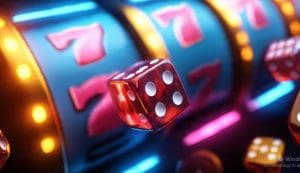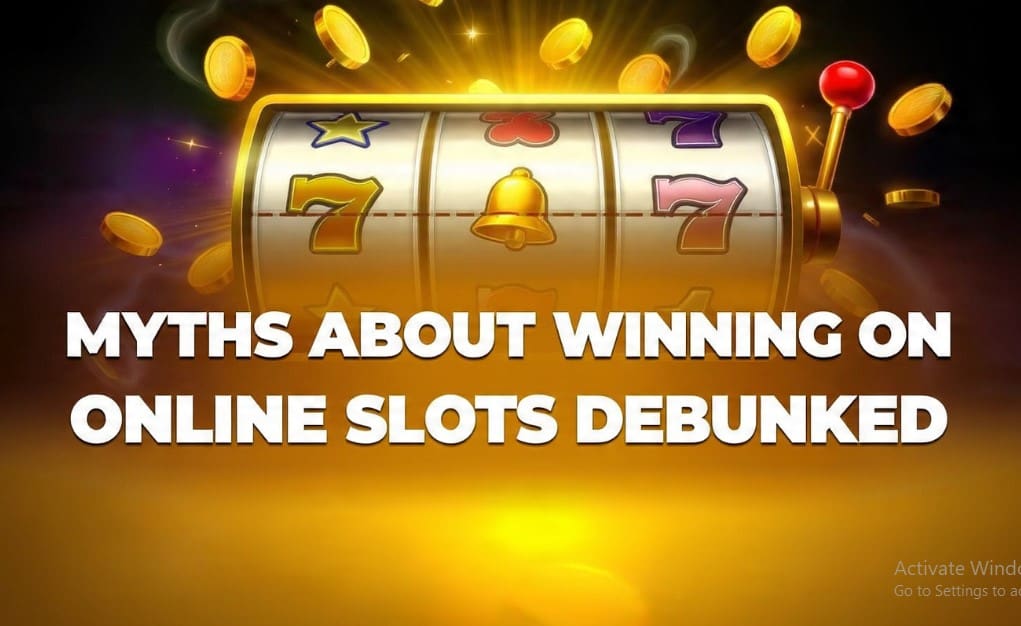Ever played an online slot and felt like it had to be your turn to win? Yeah, we’ve all been there — staring at those spinning reels, convinced luck’s just circling back to us any minute now. The truth is, slot myths are like urban legends for gamblers. Everyone swears they know someone who “cracked the code,” yet nobody really has.
Let’s have an honest chat about what’s real, what’s nonsense, and why it’s okay to love the game even when it’s totally random.
Common Myths About Winning on Online Slots
Every player’s heard at least one of these tall tales, usually from a friend of a friend who “used to work at a casino.” They sound believable because they feel like they should be true. But the reels don’t care about feelings.
Myth 1: Slots Are Due for a Win
This one’s as common as coffee at a 3 a.m. blackjack table. People swear a slot “hasn’t paid in hours” and is due. But that’s not how it works.
Slots don’t track your play history or hold grudges. Each spin is powered by a random number generator (RNG) — an invisible digital coin flip that resets every single time. You could hit a jackpot twice in a row or lose fifty spins straight; neither outcome is “building up” to anything.
I remember once camping on a machine that had “been cold all night.” Ten minutes after I left, someone else sat down and hit a bonus. Did I groan? Oh, absolutely. But it taught me something — slots have zero memory. It’s not about timing; it’s about luck.
Myth 2: Casinos Can Manipulate Outcomes in Real-Time
People love a good conspiracy. “The casino saw I was winning and flipped a switch.” Nope. Licensed online casinos can’t just decide you’ve had enough.
Every legitimate operator uses audited RNG software approved by third-party testers like eCOGRA or GLI. Once certified, it’s sealed tighter than grandma’s secret cookie recipe.
Sure, shady sites exist — avoid them. But if you’re playing on a trusted, regulated platform, the casino can’t tweak results on the fly. They can choose which slots to offer, not how those slots behave.
Think of it this way: you pick the deck; the cards are already shuffled.
Myth 3: Hot and Cold Streaks Affect Your Chances
You’ve seen it — someone hovering behind a player, whispering, “That machine’s hot!” or “It’s gone cold, time to move.” Feels intuitive, right? Except randomness doesn’t follow temperature rules.
Those streaks are just the illusion of patterns. Clusters of wins and losses happen naturally, like lucky streaks in dice rolls or coin tosses. But slots aren’t reacting to past spins — they’re just doing their math thing.
I’ve had sessions where it felt like the reels were on my side, then, ten minutes later, couldn’t land a single scatter. It wasn’t revenge. It was just probability being, well, probability.
Myth 4: Betting Max Always Increases Wins
This one trips people up because it’s half true. On some old-school machines — and a few progressive jackpots — max bets are required to unlock top-tier prizes. But most modern online slot machines calculate payouts proportionally.
Betting higher doesn’t increase your odds, it just increases your potential payout. The risk, of course, grows right along with it. If you’re playing for fun, smaller bets stretch your session (and your sanity) way longer.
Unless a slot’s rules specifically say “max bet required for jackpot,” don’t stress about it. Play the bet size that feels comfortable — the machine doesn’t reward bravery, only luck.
Myth 5: You Can Predict or Control Slot Outcomes
Ah, the “lucky spin” theory. Tap the screen three times, spin on the beat drop, hold your breath — maybe it’ll work this time? I’ve been guilty of it too. Feels silly, but it’s part of the fun.
The truth is, you can’t influence RNG results. Every spin is sealed the instant you click. Doesn’t matter if you use autoplay or time your spin perfectly. The outcome was chosen before the reels even finished animating.
Some folks swear by betting patterns or timing systems, but these only create structure, not strategy. If it helps you stay disciplined, cool. Just don’t expect it to rewrite probability.
Understanding the Reality Behind Slots
 Now that we’ve broken the myths, let’s peek behind the curtain a bit — where algorithms, not luck charms, do the heavy lifting.
Now that we’ve broken the myths, let’s peek behind the curtain a bit — where algorithms, not luck charms, do the heavy lifting.
How Random Number Generators Work
The RNG is basically a hyperactive mathematician living inside every slot. It’s constantly producing number sequences — millions per second — even when you’re not playing. Each number links to a reel position or symbol combination. When you click “spin,” the RNG stops and displays whatever combination it happened to land on.
It’s pure digital chance. No pattern, no countdown to a jackpot, no invisible hand pulling levers backstage. Developers run brutal tests on these systems to make sure they behave fairly across millions of simulated spins. That 96% RTP you see? That’s a long-term average — not a promise.
So if your last 20 spins went nowhere, it’s not a glitch. You’re just on the wrong side of random.
The Role of RTP and House Edge
Here’s where math meets mindset. Return to Player (RTP) shows what portion of all bets a slot pays back over the long haul. For example, a 96% RTP means that out of every $100 bet, the machine theoretically returns $96 to players collectively. The other $4 is the house edge — the casino’s slice of the pie.
What that means for you is that results swing wildly in the short term. You might land a 500x bonus tonight, then nothing but teases tomorrow. Over millions of spins, though, that average holds steady.
If you prefer steadier entertainment, look for low-volatility slots — small, frequent wins. Crave adrenaline? High-volatility games deliver fewer hits but bigger ones. Just don’t expect the RTP to change your luck on a single night.
Why Each Spin Is Independent
Slots don’t “warm up” or “cool off.” Each spin lives in its own little bubble of probability. Whether you’ve lost ten in a row or hit three bonuses in five minutes, your next spin starts from zero.
It’s like rolling dice. If you roll five sixes in a row, the sixth roll still has the same 1-in-6 chance. The human brain, bless it, sees streaks and starts predicting — that’s just our pattern-seeking instinct misfiring. Casinos didn’t invent it; evolution did.
How to Approach Online Slots Wisely
You can’t outsmart randomness, but you can outsmart bad habits. That’s the difference between playing and playing well.
Setting Realistic Expectations
Slots are games of chance — not skill, not strategy. If you log in expecting to “win back” last night’s losses, you’re already giving the house an edge.
I learned that the hard way. Years ago, after a losing streak, I convinced myself the machine “owed” me. It didn’t. Once I started setting clear play budgets — treating slots like entertainment, not investment — I stopped chasing and started actually having fun. Sometimes I’d win; sometimes I’d basically buy myself two hours of flashing lights and music. Both felt fine.
Responsible Gambling Practices
Let’s get real: gambling only stays fun if you stay in control. Budget, breaks, balance — the triple B’s.
Here’s a short reminder list worth keeping in your notes app:
- Set a spending limit before you start, not after.
- Walk away when you’re tilted or frustrated.
- Never chase losses — randomness doesn’t negotiate.
- Take breaks to reset your head.
- Stick with regulated casinos; RNGs should be verified, not “trust me, bro.”
Play for excitement, not escape. The moment it feels like a chore, hit pause.
Tips to Enjoy Slots Without Falling for Myths
If you strip away the myths, online slots are genuinely fun — wild themes, clever features, the suspense of a bonus round. But that enjoyment multiplies when you stop expecting control.
Experiment with different slot game developers. A NetEnt game feels slick and cinematic; a Pragmatic Play slot tends to be punchier and bonus-heavy. Try new ones, laugh at your near misses, and share the occasional “I finally hit it!” moment with friends.
You’ll realize quickly that winning isn’t the only thrill — the chase itself, the soundtrack, the ridiculous symbols, they’re all part of the charm.
Frequently Asked Questions About Slot Myths
Are online slots rigged?
Not if you play on licensed, regulated casinos. RNG audits make sure every spin’s as random as flipping a coin in space.
Does betting higher improve your odds?
Nope. It just scales your payout. A $10 spin and a $1 spin can land the same combo — one just pays more.
Can I track payout patterns to predict wins?
Afraid not. Patterns are just clusters of randomness that look meaningful but aren’t.
Do casinos secretly adjust payout rates?
Not legally. Game developers fix the RTP; casinos can’t alter it without breaking every regulation in the book.
Is there any strategy to winning?
Not in the mathematical sense. The only real “strategy” is bankroll management — and walking away with a smile.


